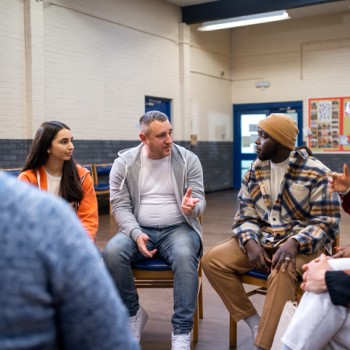Last updated on
The cost of living has gone up in the past few years, and more than ever, people are looking for free or low-cost mental health and substance use supports. And because there are a variety of ways of accessing these types of services, it can be hard to know where to start.
Free or low-cost counselling
There are several ways to seek out free or low-cost services in BC. If you want to speak to a person, you can call 8-1-1 or 2-1-1 (or text 2-1-1) to ask what might be available near you. There may be a health authority service or a non-profit organization that offers free, low-cost or sliding-scale services in your community. National organizations like the Canadian Mental Health Association may also help you find one-on-one supports in your area.
There are also virtual options where you can speak to a mental health professional over the phone or through an app or website like Zoom. You can also use HelpStartsHere.gov.bc.ca to find counselling services near you.
Keep in mind that there are crisis supports available 24/7 if you need to speak to someone immediately, such as 310-6789 (no area code needed). Or, if you’re looking for substance use supports, try calling the Alcohol and Drug Information and Referral Line: 1-800-663-1441.
What else is available?
When people think of mental health care, sometimes the first thing that comes to mind is a one-on-one in-person counselling session with a mental health professional. And while that is one of ways people can access support, there are other types of services that might help. Things like peer support, self-guided programs, support groups and other virtual options, such as BounceBack and Living Life to the Full, might also be worth exploring. Learn more about services in BC and how to find them.
Supports for young people
BC has a variety of different free services for young people seeking support. There are in-person options from Foundry Centres to Child and Youth Mental Health Clinics, as well as virtual options like the Foundry app—and there’s Kids Help Phone, too, if you need to talk to someone right now.
Visit our Youth Supporting Themselves page to learn more about what’s available, or check out the Families Supporting Youth page to find out more about supporting a young person in your life.
You can also search HelpStartsHere.gov.bc.ca for child or youth supports near you.
Supports for Indigenous people
Indigenous people in BC can access culturally safe mental health and substance use care from Canada-wide programs like Hope for Wellness, or through programs from the First Nations Health Authority, Métis Nation BC, or individual Nations. There are also crisis and support lines like KUU-US Indigenous Crisis Line and the Indian Residential School Crisis Line.
FNHA has a list of resources available to Indigenous people that you can start with. If you’d prefer to talk to someone about what you’re looking for, the First Nations Virtual Doctor of the Day program could be a good place to start.
Search HelpStartsHere.gov.bc.ca for more Indigenous supports
Supports for newcomers
For newcomers to BC, our system of care may feel unfamiliar and confusing, especially if you’re trying to navigate it in a language other than English. The Multicultural Mental Health Resource Centre can help you find the supports you’re looking for, and offers information in Chinese, Arabic, Farsi and Spanish.
There may be other supports available in your community, like the Vancouver Island Counselling Centre for Immigrants and Refugees in Victoria or MOSAIC in Vancouver. You can also learn more about multi-language services in BC.
Search HelpStartsHere.gov.bc.ca for more newcomer supports
Supports for 2SLGBTQ+ people
Services like Qmunity can help 2SLGBTQ+ folks find free or low-cost queer-competent services. TransCare BC is another resource for information and support, and they can also help with service navigation. Mind Map BC lists a variety of services—including some that cost money—but you can use their search filters to show only free resources.
Resources
Showing 3 Resources
HealthLink BC (8-1-1)
Free, reliable non-emergency health information and advice available by phone (8-1-1), online, or mobile app.
First Nations Virtual Doctor of the Day
Free access to primary and mental health care closer to home for First Nations people who have limited or no access to doctors.
Qmunity
Find wellness resources and services for queer, trans, Two-Spirit people of all ages.
